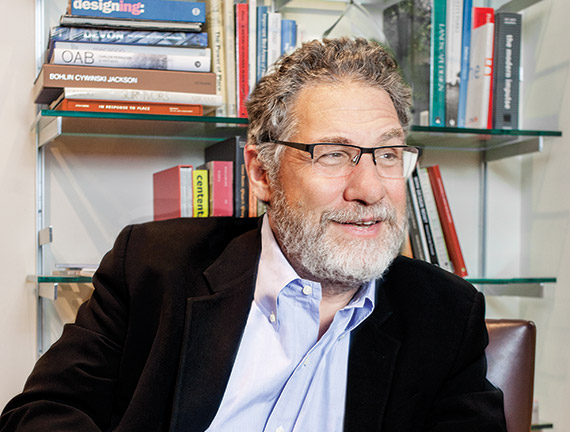A scion of the venerable Rose real estate dynasty, Jonathan Rose is a trailblazer on both the environmentally sustainable and affordable housing fronts. Guided by the idea that real estate can be a vehicle for social change, Rose has completed more than $1.5 billion in projects nationwide, including $850 million in New York. After graduating from Yale University and earning a master’s degree in regional planning at the University of Pennsylvania, the developer began his career in 1976 at Rose Associates, the firm started by his grandfather Samuel Rose and great-uncle David Rose in 1928. But after 13 years, he left the firm — which today is run by his brother, Adam, and cousin, Amy — and launched Jonathan Rose Companies. His firm currently has six projects worth $216 million underway in New York, including the nearly $80 million Harlem RBI project, which will have 89 affordable housing units, office space and a charter school. Rose’s first book “The Well Tempered City,” which examines what makes cities successful, is being published this year by HarperCollins.
Name: Jonathan Frederick Phineas Rose
Born: July 21, 1952
Hometown: Westchester, N.Y.
Marital status: Married 30 years
Children: Two daughters
Where does Phineas come from?
My father’s name is Frederick Phineas Rose, and I was named Jonathan Rose. One day when I was about six or seven, I said, ‘I want your name.’ I don’t know if they ever really [legally] changed it.
What were you like as a kid?
I was always interested in nature, the environment and issues of social justice. I’d accompany my mother in the ‘60s on voter-registration drives. I’d also go with my father to visit the Mitchell Lama projects his company was developing. I remember going on weekends to the rental offices, where families would be there with their applications, and feeling so proud that my father was creating housing they could afford.
You come from one of New York’s big real estate dynasties. What’s the family dynamic?
We are separate, but in great friendship. We had a very amicable split 25 years ago. I’m very close with my family. Several family members have invested with me, and I have invested in their projects.
When you are together, do you talk real estate?
No. Between my siblings and cousins, there are 10 of us, and most of us are not in real estate. We’re much more concerned with what’s going on in the world than with what’s going on in real estate.
Why’d you go out on your own?
Twenty-five years ago, I was developing a [mixed-use] project on the old Atlantic Terminal site. My family decided that they really preferred to work privately, versus doing public-private partnerships. They sold the site to Forest City [Ratner].… There were a series of things I wanted to do that wasn’t what the family wanted to do. And it was clear to me that it was not fair to them. There were a lot of them and only one of me.
How did your father take it?
I think at that point he knew who I was, so he was actually very supportive.

Jonathan Rose
What did you learn from the Atlantic Terminal project falling through?
It was a very, very large project, so after that I decided to do a small project perfectly and build my way up. I learned to design large projects so they could be developed in smaller pieces.
How would you describe your development philosophy?
One of the early decisions I made was that we would create extraordinary projects that would be highly duplicable.… If I created models that hundreds of other people copied, it would have much more scale. The best way to make projects copied is, they should be profitable. Very few people are going to copy a project that loses money.
Do you have hobbies outside of real estate?
One of the reasons my wife and I live in Garrison, New York, is the Appalachian Trail goes right by our house and we hike every weekend with our dogs. I also love to play music. I play bass; I have a group of friends and we just get together and play music about once a month.
So you’re in a band?
No, no. We could be a band, but I don’t want to have a band. With a band you have to perform. We make music for pleasure. It’s a range of blues, folk and more exploratory music.
Any hiking stories?
I walked the Appalachian Trail 42 years ago during spring break in college. It was March and it was cold and snowy and crummy. I was in one of those three-sided lean-to [shelters], and it was freezing; I was struggling to make dinner. I shined a flashlight on the wall, and someone had carved into the wall, “I was miserable here.”
How did you meet your wife?
When I was in my 20s, I started a jazz record company, and I met her through that world. She was producing concerts at the Cathedral of St. John the Divine for an artist named Paul Winter. I was distributing his records at the time.
What’s your favorite album to listen to?
[Pianist] Gerlinde Otto’s performance of Bach’s Well-Tempered Clavier, Book II.
How would you describe yourself in a few words?
Too busy.
If you could have dinner with anyone, who would it be?
Albert Einstein. He was not only an amazing mind, he was [also] incredibly compassionate.
Is there a building or project you wished you had done?
Rockefeller Center. But that’s obvious.
Is it?
It’s one of the best-loved, amazing [pieces] of real estate. I would have really liked to have done a building in Battery Park City. I competed to do buildings down there several times and was never able to win one.
